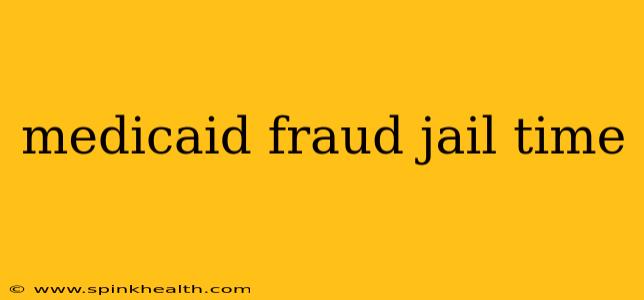The quiet hum of a hospital, the gentle rustle of paperwork – these images often evoke feelings of care and healing. But behind the scenes, a darker reality lurks: the insidious crime of Medicaid fraud. This isn't just about misplaced paperwork; it's about the deliberate exploitation of a system designed to protect the vulnerable, a crime that carries severe consequences, including significant jail time. Let's delve into the complexities of Medicaid fraud and explore the realities of its repercussions.
What Constitutes Medicaid Fraud?
Medicaid fraud encompasses a wide range of illegal activities aimed at defrauding the Medicaid program. It's not a single act, but a spectrum of deceptive practices. Imagine a healthcare provider billing for services never rendered, a patient falsifying their income to qualify for benefits, or a pharmacy submitting claims for medications never dispensed. These are just a few examples. The common thread is the intentional deception to gain financially from the system. The sheer scale of potential fraud is staggering, impacting millions of dollars annually and undermining the integrity of a system crucial to millions of Americans.
How Much Jail Time Can You Face for Medicaid Fraud?
The potential jail sentence for Medicaid fraud varies significantly depending on several factors: the amount of money involved, the nature of the fraudulent activity, the defendant’s prior criminal history, and the specific state laws. However, it's safe to say that the penalties are severe. We're not talking about a slap on the wrist; we're talking about years behind bars, coupled with substantial fines. For large-scale schemes involving millions of dollars, the sentences can reach decades. The legal system takes Medicaid fraud incredibly seriously, understanding its impact on the public trust and the vulnerable individuals who rely on this essential program.
What Are the Other Penalties Besides Jail Time?
Beyond incarceration, convictions for Medicaid fraud result in a cascade of severe penalties. These can include:
- Significant financial penalties: This often involves repaying the stolen funds, plus hefty fines that can bankrupt individuals and businesses.
- Loss of licenses: Healthcare professionals convicted of Medicaid fraud can lose their licenses to practice, effectively ending their careers.
- Civil lawsuits: Victims of Medicaid fraud can pursue civil lawsuits seeking additional compensation for damages.
- Criminal record: A felony conviction for Medicaid fraud will become a permanent part of an individual's criminal record, significantly impacting future employment and opportunities.
Can You Go to Jail for Accidentally Filing a False Medicaid Claim?
This is a critical distinction. While intentional fraud carries severe penalties, accidental errors are generally treated differently. If a mistake is made in good faith and promptly corrected, it’s unlikely to result in criminal charges. However, repeated errors or a pattern of negligence could still lead to investigation and potential penalties. The key difference lies in intent: was the act deliberate and fraudulent, or was it an honest mistake? This is a crucial factor the courts will consider.
How Is Medicaid Fraud Investigated?
Medicaid fraud investigations are often complex and lengthy, involving multiple agencies and specialized investigators. These investigations can include audits of billing records, interviews with patients and providers, and the use of sophisticated data analysis techniques to identify patterns of fraudulent activity. Federal and state agencies work collaboratively to ensure thorough investigations, and the penalties reflect the seriousness of this crime.
What Should I Do If I Suspect Medicaid Fraud?
If you suspect Medicaid fraud, reporting it is crucial. You can contact your state Medicaid agency, the Office of Inspector General (OIG), or other relevant law enforcement authorities. Protecting the integrity of the Medicaid system is a collective responsibility, and reporting suspected fraud is a vital step in ensuring that this vital program continues to serve those who need it most.
The story of Medicaid fraud is a cautionary tale: a stark reminder that even within systems designed for compassion, the threat of exploitation remains. The consequences are severe, and the fight against this crime requires vigilance, transparency, and a commitment to protecting the vulnerable.

